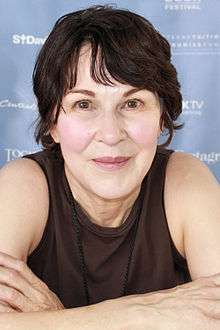Mary Jo Bang
Mary Jo Bang (born October 22, 1946 in Waynesville, Missouri) is an American poet.[1]
Mary Jo Bang | |
|---|---|
 Bang at the 2015 Texas Book Festival | |
| Born | October 22, 1946 Waynesville, Missouri, USA |
| Occupation | Poet |
| Nationality | American |
| Alma mater | Northwestern University Polytechnic of Central London Columbia University |
Life
Bang grew up in Ferguson, Missouri. She graduated from Northwestern University, in sociology, from the Polytechnic of Central London, and from Columbia University, with an M.F.A. She teaches at Washington University in St. Louis.
Her work has appeared in New American Writing, Paris Review, The New Yorker,[2] The New Republic, Denver Quarterly and Harvard Review.
Bang was the poetry co-editor of the Boston Review from 1995 to 2005. She was a judge for the 2004 James Laughlin Award.
She lives in St. Louis, Missouri.
Awards and recognitions
- Berlin Prize Fellowship, 2015
- Publishers Weekly; "2007 Best Books of the Year" St. Louis Post-Dispatch; "Most Recommended" National Book
- National Book Critics Circle Award, 2007
- Washington University Faculty Research Grant, Summer 2007
- Bellagio Foundation Fellowship 2007
- Finalist, Anna Akhmatova Award 2006
- Poetry Society of America's Alice Fay di Castagnola Award 2005 (Fannie Howe, Judge) & 2002 (Brenda Hillman, Judge)
- Bogliosco Foundation Fellowship 2005
- Guggenheim Fellowship 2004
- Pushcart Prize 2003
- "Louise in Love" listed in: "Notable Books in 2001" National Book Critics Circle; "Best Books of 2001" St. Louis Post-Dispatch
- University of Georgia’s Contemporary Poets Series Competition 2000 (Mark Strand, Judge)
- Hodder Fellowship, Princeton University 1999-2000
- Chateau Lavigny Fellowship 1999
- Great Lakes Colleges Association New Writer's Award 1998
- Yaddo Fellowship 1998
- "Apology for Want" listed in “Notable Books in 1997” by the National Book Critics Circle
- Bread Loaf Writers' Conference Fellowship, 1997
- Katharine Bakeless Nason Publication Prize 1996 (Edward Hirsh, Judge)
- MacDowell Colony Fellowship, 1996
- "Discovery" The Nation Poetry Award 1995
- Honorable Mention, Academy of American Poets Poetry Competition, 1995 (Robert Pinsky, Judge)
- Columbia University School of the Arts Dean's Award, 1994
Bibliography
Collections
- Bang, Mary Jo (1997). Apology for want. UPNE.
- Louise In Love. Grove Press. 2001. ISBN 978-0-8021-3760-9.
mary jo bang.
- The Downstream Extremity of the Isle of the Swans. University of Georgia Press. March 2001. ISBN 978-0-8203-2292-6.
- The Eye Like a Strange Balloon. Grove Press. 2004. ISBN 978-0-8021-4157-6.
- Elegy. Graywolf Press. 2007. ISBN 978-1-55597-483-1.
- The Bride of E: Poems. Graywolf Press. 2009.
- The Inferno (2013)
- The Last Two Seconds: Poems (2015)
- A Doll for Throwing: Poems (2017)
In translation
- Eskapaden. Selected Poems. German/Engl. (Luxbooks, Wiesbaden 2010)
List of poems
| Title | Year | First published | Reprinted/collected |
|---|---|---|---|
| All through the night | 2013 | Bang, Mary Jo (December 2, 2013). "All through the night". The New Yorker. 89 (39): 42–43. | |
- "The Diary of a Lost Girl"; "The Penguin Chiaroscuro"; "The Medicinal Cotton Clouds Come Down to Cover Them"; "Dark Smudged the Path Untrammeled"; "A Hurricranium, He Said"; "Speech is Designed to Persuade", Jacket 12
- "The Cruel Wheel Turns Twice". The Paris Review. Fall–Winter 2005. Archived from the original on 2009-07-07.
- "So, So It Begins Means It Begins". The New Yorker. March 30, 2009.
Anthologies
- Heather McHugh; David Lehman, eds. (2007). "The Opening". The Best American Poetry 2007. Simon and Schuster. ISBN 978-0-7432-9972-5.
- Lyn Hejinian; David Lehman, eds. (2004). "The Eye like a Strange Balloon Mounts Towards Infinity". The Best American Poetry 2004. Simon and Schuster. ISBN 978-0-7432-5757-2.
- John Tranter; John Kinsella; Tracy Ryan, eds. (2002). "Don't Know Why There's No Sun Up in the Sky Stormy Weather". Salt an International Journal of Poetry and Poetics. Salt Publishing. ISBN 978-1-876857-47-9.
Reviews
Wayne Koestenbaum writes:
Mary Jo Bang's remarkable elegies recall the late work of Ingeborg Bachmann—a febrile, recursive lyricism. Like Nietzsche or Plath, Bang flouts naysayers; luridly alive, she drives deep into aporia, her new, sad country. Her stanzas, sometimes spilling, sometimes severe, perform an uncanny death-song, recklessly extended—nearly to the breaking point.[1]
David Orr writes:
This is perhaps why Mary Jo Bang largely succeeds in her new book of elegies for her son, called, simply enough, “Elegy.” Bang’s previous four collections are polished and frequently interesting, but they also contain more than their share of overwrought and overthought poetry about poetry....That can’t be said of “Elegy.” This is a tightly focused, completely forthright collection written almost entirely in the bleakest key imaginable. The poems aren’t all great, some of them aren’t even good, but collectively they are overwhelming — which is both a compliment to Bang’s talent and to the toughness of mind that allowed her to attempt this difficult project in the first place.[3]
References
- "Mary Jo Bang | Academy of American Poets". Poets.org. 1946-10-22. Retrieved 2014-06-30.
- https://www.newyorker.com/search/query?query=Mary+Jo+Bang&queryType=nonparsed&submitbtn.x=39&submitbtn.y=14&submitbtn=Submit
- DAVID ORR (March 30, 2008). "In Memoriam". The New York Times.